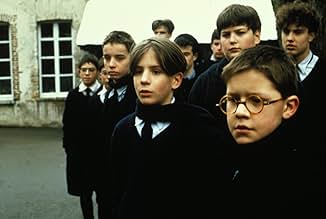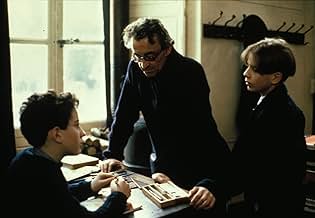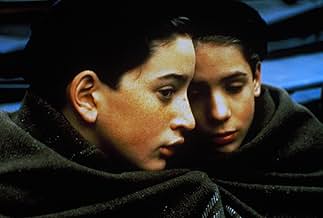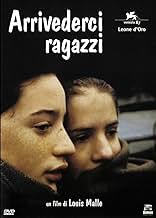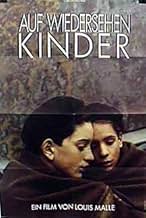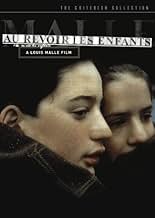Au revoir les enfants
- 1987
- Tous publics
- 1h 44min
NOTE IMDb
8,0/10
38 k
MA NOTE
Un internat français dirigé par des prêtres semble être épargné par la Seconde Guerre mondiale... jusqu'à l'arrivée d'un nouvel élève. Il devient le voisin de dortoir du premier de la classe... Tout lireUn internat français dirigé par des prêtres semble être épargné par la Seconde Guerre mondiale... jusqu'à l'arrivée d'un nouvel élève. Il devient le voisin de dortoir du premier de la classe. Rivaux au début, ils finissent par se lier d'amitié et partager un secret.Un internat français dirigé par des prêtres semble être épargné par la Seconde Guerre mondiale... jusqu'à l'arrivée d'un nouvel élève. Il devient le voisin de dortoir du premier de la classe. Rivaux au début, ils finissent par se lier d'amitié et partager un secret.
- Réalisation
- Scénario
- Casting principal
- Nommé pour 2 Oscars
- 28 victoires et 12 nominations au total
Stanislas Carré de Malberg
- François Quentin
- (as Stanislas Carré De Malberg)
Luc Etienne
- Moreau
- (as Luc Étienne)
Avis à la une
After a few years making movies in the United States, Louis Malle returned to his native France and made "Au revoir les enfants", based on his memories of growing up in Nazi-occupied France. The movie focuses on the friendship between two boys in a Carmelite boarding school, one of whom is keeping his real identity secret.
A particularly effective scene is in the restaurant. There are some Wehrmacht officers at a table, but they keep to themselves. Then the Milice enters and orders a Jewish patron out of the restaurant. The Wehrmacht officers then order the Milice to leave. This emphasizes not only the role of the Vichy government, but also the role of the collaborators in every country that Germany occupied.
I haven't seen all of Malle's movies, but this is probably the best of his movies that I've seen. The final scene has to be one of the most chilling in cinema history. I recommend the movie.
A particularly effective scene is in the restaurant. There are some Wehrmacht officers at a table, but they keep to themselves. Then the Milice enters and orders a Jewish patron out of the restaurant. The Wehrmacht officers then order the Milice to leave. This emphasizes not only the role of the Vichy government, but also the role of the collaborators in every country that Germany occupied.
I haven't seen all of Malle's movies, but this is probably the best of his movies that I've seen. The final scene has to be one of the most chilling in cinema history. I recommend the movie.
10Sloke
The movie was a project close to Louis Malle's heart (he was in tears when the film premiered at a film festival in 1987) and it shows in the multi-layered treatment he gives the central setting, this fascinating boarding school with its broad cast of characters. Because there are so many different strands and affecting moments tangential to the central plot, one is not entirely prepared for the finale even if you are expecting it. French film is characteristically digressive, often to a fault, but here it works to splendid advantage. It also lends itself to repeat viewings.
I don't think you need to have lived in occupied Europe to appreciate this wonderful film; it speaks to all of us who have lived through childhood's quickly-passing parade and know its lifelong regrets. That last image of the stone wall is emblazoned in many consciousnesses, as it is in mine.
There are many interesting choices Malle makes in this film. For example, while the central subject is the Holocaust, nearly all the Germans we actually see in the film are fairly decent if nonetheless menacing types. The real villains here are almost entirely French collaborators, which was done I think to call attention to collaboration during a period when the French were dealing with the Klaus Barbie trial. [Barbie was a Gestapo officer who was aided in his work rooting out Resistance leaders by many French collaborators.] But casting French people as the heavies also suggests the central evil of prejudice and oppression is not something exclusive to one nationality, and it broadens the scope of the movie.
The tender treatment Malle affords the Catholic hierarchy in the movie is unusual, too, when you see other more anti-clerical Malle efforts like "Murmur of the Heart." There is an unexpected sense of spirituality throughout this film, somewhat muted but there all the same.
This may well stand as the cinematic masterpiece of a man who, at his best (see also "Atlantic City" and "My Dinner With Andre") was to motion pictures what his countrymen Zola and Hugo were to novels: An artist who filled his canvas with the verve and breadth of human life.
I don't think you need to have lived in occupied Europe to appreciate this wonderful film; it speaks to all of us who have lived through childhood's quickly-passing parade and know its lifelong regrets. That last image of the stone wall is emblazoned in many consciousnesses, as it is in mine.
There are many interesting choices Malle makes in this film. For example, while the central subject is the Holocaust, nearly all the Germans we actually see in the film are fairly decent if nonetheless menacing types. The real villains here are almost entirely French collaborators, which was done I think to call attention to collaboration during a period when the French were dealing with the Klaus Barbie trial. [Barbie was a Gestapo officer who was aided in his work rooting out Resistance leaders by many French collaborators.] But casting French people as the heavies also suggests the central evil of prejudice and oppression is not something exclusive to one nationality, and it broadens the scope of the movie.
The tender treatment Malle affords the Catholic hierarchy in the movie is unusual, too, when you see other more anti-clerical Malle efforts like "Murmur of the Heart." There is an unexpected sense of spirituality throughout this film, somewhat muted but there all the same.
This may well stand as the cinematic masterpiece of a man who, at his best (see also "Atlantic City" and "My Dinner With Andre") was to motion pictures what his countrymen Zola and Hugo were to novels: An artist who filled his canvas with the verve and breadth of human life.
"More than 40 years have passed, but I'll remember every second of that January morning until the day I die."
Part of what makes this autobiographical film from Louis Malle so powerful is that a big portion of its coming of age material is universal. In a Catholic boarding school we see hazing and random bullying while ineffectual headmasters look the other way, bedwetting, reading after hours, playground battles, curiosity about girls, and the kind of childhood events that get remembered for life, like getting lost in the woods. In other words, it's just boys trying to get through the difficulties of growing up, and really could be any group of boys, at any time.
But of course this isn't just any period, it's occupied France during WWII, and while the school full of affluent kids seems mostly insulated from that, danger lurks. Three new boys who have been admitted and given new names are secretly Jews, a fact which gradually becomes known by Julien, one of the smarter students (Gaspard Manesse, playing the young Malle). He has a rivalry and a friendship with one of the new boys (played soulfully by Raphaël Fejtö), and the nuances of their relationship not only felt authentic, but it made it hard to know how the film would play out.
I love the dimensions of the film, including the differing Catholic responses to the Jewish issue in Vichy France - some good, some bad. There is also an axis of rich/poor, and I loved the sermon where the priest shocks the visiting parents by criticizing the behavior of the wealthy. Lastly, the use of the Chaplin film 'The Immigrant' (1917) within the film is pitch perfect, and a masterful touch.
Part of what makes this autobiographical film from Louis Malle so powerful is that a big portion of its coming of age material is universal. In a Catholic boarding school we see hazing and random bullying while ineffectual headmasters look the other way, bedwetting, reading after hours, playground battles, curiosity about girls, and the kind of childhood events that get remembered for life, like getting lost in the woods. In other words, it's just boys trying to get through the difficulties of growing up, and really could be any group of boys, at any time.
But of course this isn't just any period, it's occupied France during WWII, and while the school full of affluent kids seems mostly insulated from that, danger lurks. Three new boys who have been admitted and given new names are secretly Jews, a fact which gradually becomes known by Julien, one of the smarter students (Gaspard Manesse, playing the young Malle). He has a rivalry and a friendship with one of the new boys (played soulfully by Raphaël Fejtö), and the nuances of their relationship not only felt authentic, but it made it hard to know how the film would play out.
I love the dimensions of the film, including the differing Catholic responses to the Jewish issue in Vichy France - some good, some bad. There is also an axis of rich/poor, and I loved the sermon where the priest shocks the visiting parents by criticizing the behavior of the wealthy. Lastly, the use of the Chaplin film 'The Immigrant' (1917) within the film is pitch perfect, and a masterful touch.
Au Revoir Les Enfants (1987)
A wrenching, sensitive, all-too-true drama set in a gorgeous French wooded outpost during World War II. The main actors are boys, and they play their parts with unusual conviction, unexaggerated but with intensity. And the anti-Semitism that arises, though inevitable in Nazi territory, comes subtly and really stings. The movie isn't complete without this horror, but the horror is made complete by the really vivid recreation of this kind of private boys school--a period movie at its best.
Director Louis Malle has not only a message, but a sensitive feel for the medium--for making fluid the flow and background of the plots of his films. It's also a fairly complex mix of types, and you can somehow keep them all straight as it goes--as straight as you are meant to as the facts unfold. In the end, it confirms a familiar story of Nazi terror, but one that can't be told too often.
A wrenching, sensitive, all-too-true drama set in a gorgeous French wooded outpost during World War II. The main actors are boys, and they play their parts with unusual conviction, unexaggerated but with intensity. And the anti-Semitism that arises, though inevitable in Nazi territory, comes subtly and really stings. The movie isn't complete without this horror, but the horror is made complete by the really vivid recreation of this kind of private boys school--a period movie at its best.
Director Louis Malle has not only a message, but a sensitive feel for the medium--for making fluid the flow and background of the plots of his films. It's also a fairly complex mix of types, and you can somehow keep them all straight as it goes--as straight as you are meant to as the facts unfold. In the end, it confirms a familiar story of Nazi terror, but one that can't be told too often.
This movies is one of those movies that you can love, but hate. It makes you hate what happens in the movie. You get so attached to the characters, and when things happen to them, you hate it. But the movie is powerful, wonderfully written and directed by Louis Malle and defiantly should be seen anytime one is studying WWII or the Holocost, or if you have free time, and are looking for a good heart-wrencher. I watched it in French, with subtitles, and that makes it all the better.
Le saviez-vous
- AnecdotesBased on an incident from Louis Malle's own youth. Julien is modeled after Malle.
- GaffesWhen hiking, Julien asks what day it is and is told that it's Thursday, January 17th, 1944. That date was actually a Monday.
- Crédits fousPour Cuotemoc, Justine et Chloé. (opening credits)
Meilleurs choix
Connectez-vous pour évaluer et suivre la liste de favoris afin de recevoir des recommandations personnalisées
- How long is Au Revoir les Enfants?Alimenté par Alexa
Détails
- Date de sortie
- Pays d’origine
- Site officiel
- Langues
- Aussi connu sous le nom de
- Le nouveau
- Lieux de tournage
- Sociétés de production
- Voir plus de crédits d'entreprise sur IMDbPro
Box-office
- Montant brut aux États-Unis et au Canada
- 4 542 825 $US
- Montant brut mondial
- 4 575 613 $US
- Durée1 heure 44 minutes
- Couleur
- Mixage
- Rapport de forme
- 1.66 : 1
Contribuer à cette page
Suggérer une modification ou ajouter du contenu manquant

![Regarder Bande-annonce [VOST]](https://m.media-amazon.com/images/M/MV5BZDlkMTI5OTgtNmU4My00MzRjLWFkNzMtYmMyMDlhNjQ2OTFmXkEyXkFqcGdeQXRyYW5zY29kZS13b3JrZmxvdw@@._V1_QL75_UX500_CR0)
